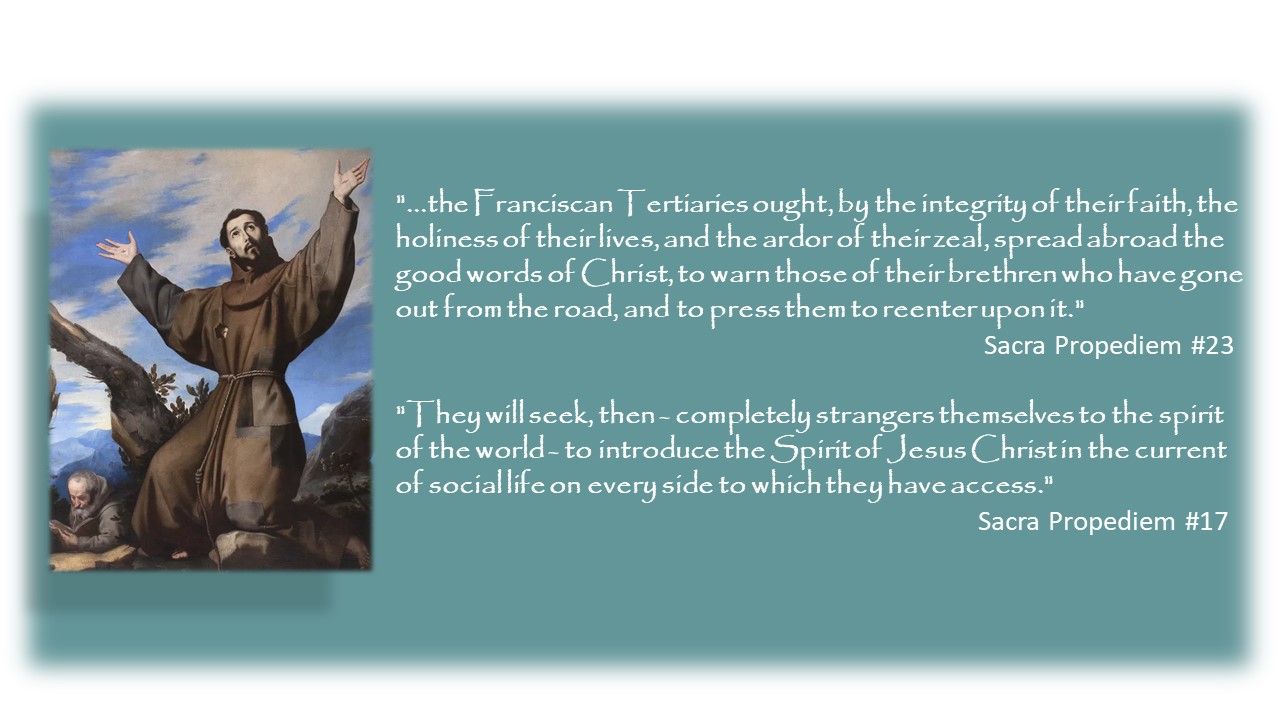Evangelization
From Call to Commitment, Eleventh Lesson:
“The Gospel was St. Francis’ rule of life. Now, the Gospel relates the story of Christ coming to do his Father’s will, to save men, and to set up his kingdom. The obvious conclusion was that Francis was called to do the same thing; and fundamental to the whole Gospel mission, as the ministry of John the Baptist clearly shows, is the preaching of penance. It was inconceivable, therefore, that Francis not pursue the same apostolic mission.
“So our Holy Father founded what is called the “mixed life,” which was something quite new in the tradition of religious orders. That is, he “mixed” our Lord’s life of contemplation of the Father with that apostolic activity which likewise characterized Christ’s life. His imitation of Christ was to be total; therefore it had to include both aspects…
“After the Rule had been approved by the Pope, Francis chose not to live for himself alone, but for Him who died for all, knowing that he was sent for this that he might win for God the souls the devil was trying to snatch away (1 Celano 35).
“For he used to say that nothing is more important than the salvation of souls, and he often offered as proof the fact that the Only-begotten of God deigned to hang on the cross for souls. This accounts for his struggles at prayer, his tirelessness at preaching, his excess in giving examples. He did not consider himself a friend of Christ unless he loved the souls that Christ loved (2 Celano 172).
“… It was, as we have seen, Christ’s own example that led Francis to spend himself for the salvation of men… He had but one longing: to follow Christ.
“… There is no question, for example, of neglecting the love of God in order to work for the salvation of our brothers; all we have to do is give ourselves over completely to the love of Christ and allow ourselves to be caught up by Him in His work of redemption. There is, in other words, a fundamental harmony and unity between love of God and love of men. For Francis, the apostolate consisted simply and essentially of associating oneself with the redemptive mission of Jesus Christ.
“… Let every Tertiary, therefore, be convinced that he has been sent by God as Francis was, to make Christ known and loved.”
From the Constitutions, Section IV: “The Works of the Apostolate”:
Article 77:“The Third Order is a chosen company in the peace loving army of laypeople, drawn up in constant readiness for the defense of the kingdom of Christ and its spread throughout the world. Hence, following in the footsteps of their Seraphic Father, tertiaries shall, more than others, defend and support the Church, and give it new life” (Pope Pius XII, Address to Tertiaries, 1 July 1956, Acta Ap. Sedis, p. 577).”
Article 78: “Tertiaries, as heralds of the Great King, shall therefore spend themselves for the salvation of their neighbor in works of charity and of the apostolate. They shall work energetically in promoting the Catholic Faith, and in defending the Church and the Roman Pontiff. They shall devote themselves principally to the works and duties that are especially proper to the Franciscan Order, as for instance, the missions, the promoting of religious vocations, etc., or to the projects passed over by others.”
As Tertiary Franciscans, our participation in the apostolate of sanctification is put into practice first in our family. It is through personal witness, family prayer, sharing the Word of God and catechesis that we share God’s love with those dear to us.
You may find members of our fraternity living their Franciscan vocation at home with their children or caring for sick loved ones. You may find them in their communities working at soup kitchens, serving their parish, helping the homeless or praying at abortion clinics. You may find them in their work environments as custodians, healthcare workers, business world, engineers, retired, teachers and serving the incarcerated, just to name a few.
As a community, our fraternity has several apostolates, all of these with the purpose of making Christ known and loved and assist in His redemptive mission. These include caring for the infirm, sharing the Word of God with the incarcerated, feeding the homeless, pro-life apostolate, tuition assistance for seminarians, donating food items, dry goods and personal hygiene products to local parish pantries and actively assisting the local Church.
“In a very real sense, prayer must come first. Missionary activity, important and noble as it is, must actually be no more than a spontaneous flowering of the love of Christ that comes only in prayer.” From Call to Commitment

